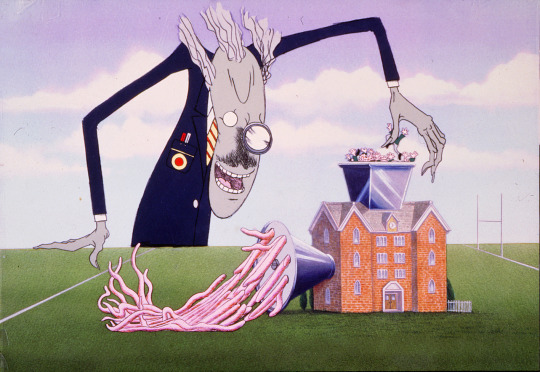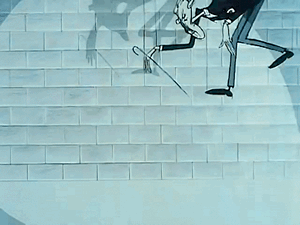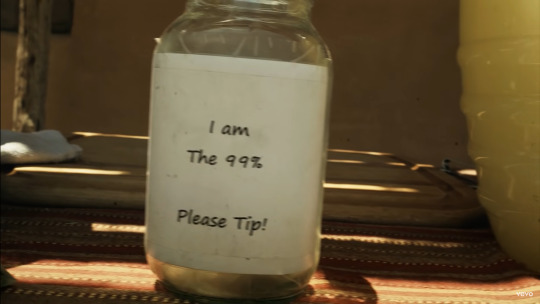Don't wanna be here? Send us removal request.
Text
Discussion Leader Presentation "Ideology"
Another Brick in the Wall Part 2
"Another Brick in the Wall Part 2," by the band Pink Floyd, was released in 1979 and revolutionized the music industry. The song is a direct protest against teachers, especially of that time, that would strictly enforce and indoctrinate their views and ideologies upon their students. The education system and teachers were often prioritizing student's subservience and academic performance, rather than their creativities, ambitions and even their wellbeing. Students were churned into one mold, designed to become obedient and simply cogs in the societal machine.
youtube
The themes of Pink Floyd's "Another Brick in the Wall Part 2" directly relate to Karl Marx's teachings of ideology. In his manuscript, "The German Ideology," Marx explains how labor workers and those of lower classes are used and exploited for the benefit of the bourgeoisie, or the rich. This process begins at the school system, which the song demonstrates, where children are designed to fit the ideals of the workforce; compliant to authority and robbed of their own ideologies or opinions. In doing this, the school system causes students to lose their own identities. This is made apparent in the visuals used throughout the song, such as the hammers walking in unison with no differentiation amongst them.

The hammers are also a symbol of control, quite literally displaying how the school system "hammers" their ideologies into students. All the children are hammered into the same template. Interestingly, the hammers also represent the Nazi regime which was known for the brainwashing of ideologies amongst their own people. These themes correlate with Antonio Gramsci's "Hegemony," as he discusses the ideas of government's control over their people with the false notion of "consent." Lower class citizens and laborers are bent into submission by those who have power, with the illusion that since they are a part of the society they are to actively consent to the dominance of their superiors.
The teacher is displayed as monstrous in appearance, quite literally putting children into a meat grinder that represents the school system. The outcome is a pile of meat, devoid of personality and life.

While the students are the central focus of the visual text, the song displays how teachers are also puppets of the school system and are subjected to the government's hegemony.

Depicted in this image, is quite literally the teacher tied to strings being used as a puppet. He too is under the control of those that have higher authority over him. The teacher's ideologies and abusiveness towards his students are also traits that have been indoctrinated into him by his superiors. The teacher's ghoulish appearance and lifelessness is a clear representation of how society drains one of their ambitions and characteristics.
Active protest to such control by the school system and the government is made in the lyrics:
We don't need no education We don't need no thought control No dark sarcasm in the classroom Teacher, leave them kids alone
Fortunate Son
"Fortunate Son," released in 1969 by Creedence Clearwater Revival, is a protest song against the Vietnam War and the American government as a whole. During the Vietnam War, those of higher status and wealth did not have to fight in the war while tens of thousands of lower class citizens were drafted to die for their country and its ideologies. Again, they were forced to be subservient to authority, with the safety of their lives literally being dictated by their societal status.
This song relates to Pink Floyd's "Another Brick in the Wall Part 2," as both songs are made in reference of revolting against government corruption and put on display the sacrifices one must make for those who are deemed superior.
youtube
The music video demonstrates these themes a in lighter, more hopeful sense. The video shows lower class citizens still enjoying their lives in the presence of one another, rather than in materialistic riches. However, the themes of anti-authority and anti-elitism are still very much present.

Images such as these depict the struggles that lower class citizens face and the arduous work that one must endure to live in society. Again, this ties into society's false sense of consenting to its principles. The government promotes the idea that one consents to its ideals by being a part of society, giving one no choice but to do so, as not consenting would force one to live homeless, foodless and ironically, without their natural liberties. This relates to the lives of those who served in the Vietnam War, as in order to be a part of society, they had no choice but to fight a war that was created based on the ideologies of the government.
The US government invaded Vietnam to prevent the spread of communism, placing their own capitalist ideologies above the lives of the laborers of society.

It ain't me, it ain't me I ain't no senator's son, son It ain't me, it ain't me I ain't no fortunate one, no
Some folks are born silver spoon in hand Lord, don't they help themselves, Lord? But when the taxman come to the door Lord, the house lookin' like a rummage sale, yeah
It ain't me, it ain't me I ain't no millionaire's son, no, no It ain't me, it ain't me I ain't no fortunate one, no
In the music video and lyrics, the phrase "It ain't me" is used to describe how the working class do not get the same luxuries as the rich. They are not born with a "silver spoon in hand," and instead must work rigorously and, in some cases, are even are forced to surrender their lives for their government.
Discussion Questions:
Do you believe that protest music such as "Another Brick in the Wall" and "Fortunate Son" inspire the youth to stand up for themselves and revolt against injustices?
2. In what ways have these visual texts increased societal awareness? Have they been used to foster change? If so, how and when?
3. It can be argued that this music helps the mental health of those who are feeling oppressed. Do you believe this is true?
1 note
·
View note